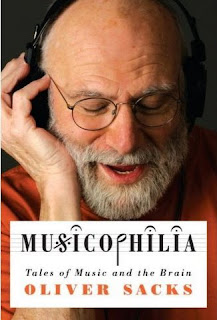 hich the brain and music are related. The title’s Greek suffix suggests a mutual relationship and love between music and the individual. Sacks examines that relationship, finding it extraordinarily complex and not fully understood. His web site describes him as being best known for his “collections of case histories from the far borderlands of neurological experience.” This is a pretty good description of his writing, highlighting both the strengths and weaknesses of this book.
hich the brain and music are related. The title’s Greek suffix suggests a mutual relationship and love between music and the individual. Sacks examines that relationship, finding it extraordinarily complex and not fully understood. His web site describes him as being best known for his “collections of case histories from the far borderlands of neurological experience.” This is a pretty good description of his writing, highlighting both the strengths and weaknesses of this book. Characterized on the cover as “Tales of Music and the Brain,” this book is most interesting in telling stories about the often mysterious ways in which music affects people of all kinds. The occurrence of absolute (perfect?) pitch, the appearance of musical talent after being hit by lightning where none had be apparent before, people afflicted with all kinds of music in their heads, the persistence of musical ability in cases of otherwise nearly total dementia, musical talent in those of extremely limited ability, the loss of musical talent to neurological insult…the stories are interesting and varied. Each individual has a different story. And herein lies one of the problems with this book. I had difficulty finding a linking principle to help tie together these threads until the very end. They seemed like a disassociated collection of stories not leading me to any generalizations I could make about the nature of humanity or music.
Sacks presents too much “brain geography” for this general reader to integrate into his understanding of how what goes on in the brain effects how people experience music. I had difficulty identifying with lobes and ganglia and regions and areas. These have little meaning. The stories Sacks tells became interesting vignettes as I searched for an organizing principle for the narrative to help me gain perspective on the works of the mind/brain. His heavy reliance on footnotes, some of them quite relevant, to make certain points, nevertheless proved themselves to be distracting, as they don’t add materially to the points he wishes to make but attract my attention sufficiently to require me to read them. Perhaps offering extended end notes rather than footnotes would have been helpful. At times this book skirts the distinction between a scholarly effort and an informative overview, leaning too heavily towards the former.
I found Sacks to be encouraging to my own musical ambitions in some ways. Levitin had assured me that musical ability was widespread, potentially as broad as color perceptions, and that sufficient practice would yield results. As I work on my banjo, I often become discouraged as the improvement I seek just doesn’t seem to be coming, and I wonder if what bluegrassers call “drive” or “bounce” is something I can learn. Sacks delineates any number of neurological deficits leading to inabilities to perceive or reproduce musical tones, rhythms, pitches, and so-on. S ome of the cases he presents characterize sufferers experiencing music as “screeching” or “like pans clashing in the kitchen.” He tells about those who cannot recognize when one tone is higher or lower than another. As I’ve watched my wife improve steadily on her mandolin, developing skills I can only hope for myself and admire, I now recognize she has a much broader set of abilities and perceptions than I. Maybe she also works harder.
ome of the cases he presents characterize sufferers experiencing music as “screeching” or “like pans clashing in the kitchen.” He tells about those who cannot recognize when one tone is higher or lower than another. As I’ve watched my wife improve steadily on her mandolin, developing skills I can only hope for myself and admire, I now recognize she has a much broader set of abilities and perceptions than I. Maybe she also works harder.
Perhaps the great lesson of the tales Sacks tells in Musicophilia lies in opening to readers the great power music has to affect the human mind and soul, although he avoids such a concept as soul. People lost to ordinary intercourse in the world, those with brain damage, dementia, or genetic differences can respond to and perform music even though their ability to respond using conventional speech or relying on memory has either disappeared or has never been present. Overall, the effect is to increase our respect for and wonder at the marvelous organ we call a brain and the mind it spawns. Arguments concerning whether music or speech came first, how we developed our musical sense, what the meaning of these stories is, in the end, pale beside the awareness of how much more we are than we know or recognize.
Ted, I hope you and your family had a very merry Christmas!
ReplyDeleteTed,
ReplyDeleteAs you might expect this was a good one for me. Maybe he could study some of my bluegrass guys, but he may not be sufficiently funded or have enough time for such an undertaking!
-Dr. B
Or they might not be far enough along in their dementia. While bluegrass musicians may be a little nutsy, they probably aren't far enough gone for Sacks - TEP
ReplyDelete